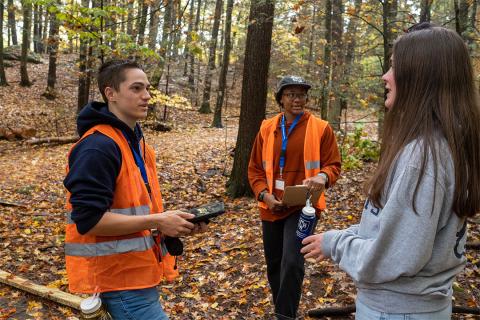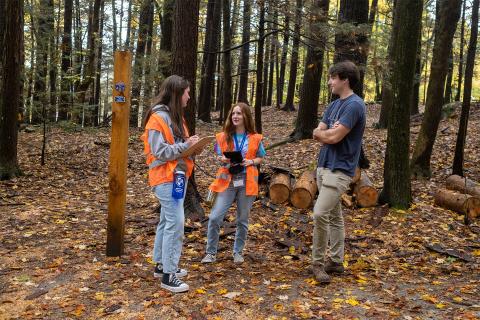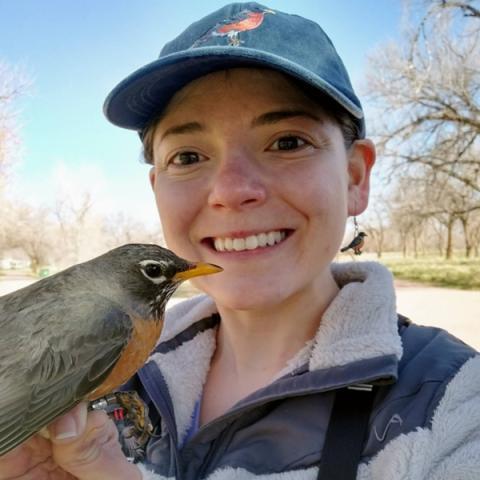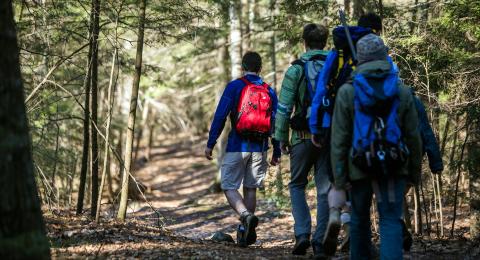RESEARCH GOAL

Identify a link between biodiversity and recreational experiences to better inform forest management practices and recreational education resources.
UNH College of Life Sciences and Agriculture: Remington Moll (project lead), Karina Sanchez, Laura Kloepper
UNH College of Health and Human Services: Lauren Ferguson (project lead)
Hiking's popularity in the United States continues to surge, benefiting New Hampshire's recreational tourism landscape. The White Mountain National Forest attracts over six million visitors annually with its extensive network of hiking trails. And while research highlights the physical and mental health benefits of hiking, exploring how the biological diversity of the forest can further enhance these benefits.
“There’s a large body of evidence that shows humans have improved physical and mental health outcomes when they are exposed to natural environments,” described Lauren Ferguson, an assistant professor of recreation management and policy at the UNH College of Health and Human Services. “We are still trying to uncover what exactly it is about natural environments that is beneficial for human health and wellbeing?”


Students in the recreation management and policy program at CHHS conduct mock surveys in UNH's College Woods.
“Perhaps it’s the biodiversity,” she added. “The more species we see and hear could influence our experience and the ecosystem services we receive from spending time in natural spaces.”
The study seeks to understand the connection between mood, mental well-being and the biodiversity of the surrounding environment, with a goal of investigating whether hiking on trails with greater and more diverse animal and plant life can improve psychological well-being. Beginning this summer, the research team began conducting field experiments at UNH woodland properties. In addition to measuring the biodiversity of birds, mammals and frogs at the various sites, they also surveyed visitors to gauge their perceptions of wildlife biodiversity and psychological well-being in relation to hiking and walking. The study will span all four New England seasons to assess the seasonal influence on visitors' perception of biodiversity and its impact on their well-being.
“The more species we see and hear could influence our experience and the ecosystem services we receive from spending time in natural spaces.” ~ Lauren Ferguson, assistant professor of recreation management and policy, CHHS
According to Laura Kloepper, an assistant professor of biological sciences in the UNH College of Life Sciences and Agriculture, the project also offers an opportunity to expand UNH’s growing acoustic ecology research program.
"Many animals make species-specific vocalizations,” described Kloepper, “so we can identify what animals are using College Woods, even if we can’t see them.”
“So far this summer, we have found five bat species—more than half the number of bat species known to reside in New Hampshire,” she added.
By quantifying the connections between biodiversity and human recreational experiences, the team aims inform holistic forest management that considers important links between humans and natural ecosystems. They believe that coordinated management and outreach efforts can uncover and enhance these connections, benefiting both wildlife conservation and the well-being of visitors. The findings of this research project can inform forest management practices related to recreational education, emphasizing the importance of biodiversity and sound forest management practices in enhancing visitors' experiences.
This material is based on work supported by the NH Agricultural Experiment Station through joint funding from the USDA National Institute of Food and Agriculture (under Hatch award number 7004025) and the state of New Hampshire.

Rem Moll, Assistant Professor of Natural Resources and the Environment (project lead)
Contact:
Remington.Moll@unh.edu, Wildlife Modeling & Management Lab

Lauren Ferguson, Assistant Professor of Recreation Management & Policy (project lead)
Contact:
Lauren.Ferguson@unh.edu

Laura Kloepper, Assistant Professor of Biological Sciences
Contact:
Laura.Kloepper@unh.edu, Ecological Acoustics and Behavior Lab

Karina Sanchez, Postdoctoral Research Associate, Natural Resources and the Environment
Contact:
Karina.Sanchez@unh.edu


